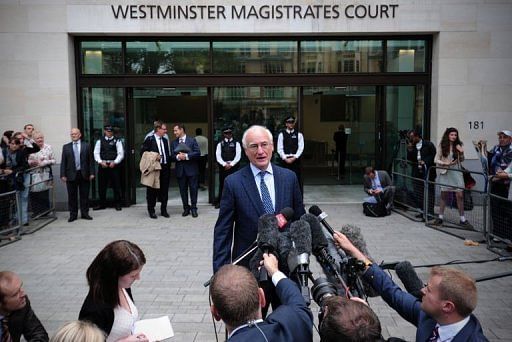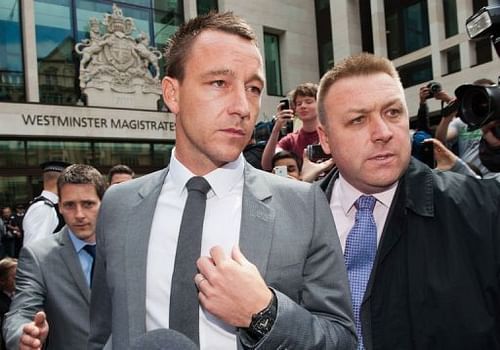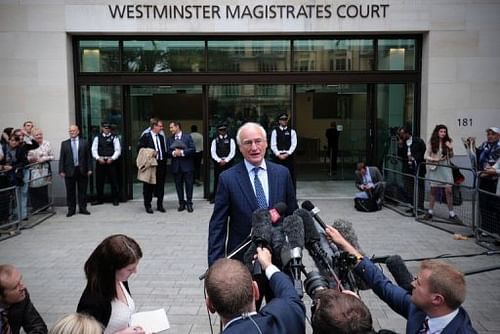
FA could act against Terry despite acquittal
LONDON (AFP) –

Chelsea and England footballer John Terry leaves Westminster Magistrates’ Court in London. Terry was cleared on Friday of allegations that he racially abused rival footballer Anton Ferdinand, the judge saying it was the “only verdict” he could reach.
John Terry could yet face disciplinary action from the Football Association (FA) despite his acquittal on a racism charge, analysts said.
Chelsea captain Terry was found not guilty of racially abusing rival player Anton Ferdinand at the end of a five-day trial at Westminster Magistrates Court in London on Friday
Chief Magistrate Howard Riddle heard three days of evidence, with Terry’s fellow Chelsea and England defender Ashley Cole among those taking the witness stand, and one day of summaries.
Though it was not the issue being judged, Riddle said he had substantial evidence to confirm Terry was not a racist.
He said there was no dispute that Terry directed the words at Ferdinand, but the issue was whether Terry used the words “by way of insult”.
“He says they were used after a perceived false accusation made by Mr Ferdinand, the accusation being to the effect that the defendant had used the term.”
Terry’s reputation had been “at stake” during the trial, Riddle said.
But his account had been subject to “the most searching and thorough questioning” and “nobody has been able to show that he is lying”.
But Simon Boyes, senior lecturer at Nottingham Law School, said the FA still had “wiggle room” to act against Terry and that, far from hindering them, a criminal trial could help their deliberations.

Chairman of Chelsea Football Club Bruce Buck speaks to the media outside Westminster Magistrates court in London. Chelsea captain John Terry was cleared Friday of a charge of racially abusing his fellow footballer Anton Ferdinand.
The trial related to an incident involving Terry and Queens Park Rangers defender Ferdinand during a Premier League match on October 23 last year.
Terry was stripped of the England captaincy in February over the allegations. As a consequence, Fabio Capello resigned as England manager, just months before England, defender Terry included, competed in the 2012 European Championships.
Meanwhile the FA put their own disciplinary process on hold so as not to prejudice the trial.
But English football’s governing body reacted to Friday’s verdict by saying: “The FA notes the decision in the John Terry case and will now seek to conclude its own enquiries. The FA will make no further comment at this time.”
Boyes, author of the textbook Sports Law, said the FA needn’t be constrained by the court ruling.
“The FA have got quite a bit of wiggle room,” he told AFP in a telephone call after Friday’s verdict had been announced.
“They have different charges — such as bringing the game into disrepute — which require a different standard of proof.
“It may well be the criminal trial is helpful to them as they can use the evidence from that,” Boyes added.
With the court ruling in Terry’s favour, many of his supporters believe that should be the end of the matter.
But Boyes was not so sure.
“I would be surprised if there was no disciplinary action forthcoming. That’s not necessarily due to the racial element. There are other aspects the FA could look at, such as the manner of the players’ conduct.”
Meanwhile Lord Herman Ouseley, chairman of the Kick it Out campaign which seeks to eradicate racism from football, urged the FA to take its own, independent, action.
“There is only one regulatory body for football and it’s not the courts,” Ouseley told Sky Sports.
He added: “The Football Association would have already concluded its investigations and its processes had the courts not intervened through the police and the Crown Prosecution Service.
“Their prosecution and evidence was inadequate and John Terry has been cleared of what he was charged on.”
Asked if the verdict could deter players who had been racially abused coming forward in future, Ouseley said: “There is clear evidence we know that players are reluctant to come forward and raise this issue.
“It impacts on their own performance on the field, it impacts on their relationship within the club. There is a culture in the dressing room which has to be tackled, people are very fearful and do not come forward.
“We’ve got to work hard now to try and establish some credibility about the complaints’ processes to ensure they are dealt with properly.
“That means that in future the Football Association will have to carry out its own investigations, conclude its deliberations, irrespective of whether the police get involved.
“And I am afraid the police involvement in this case has not helped it whatsoever.”